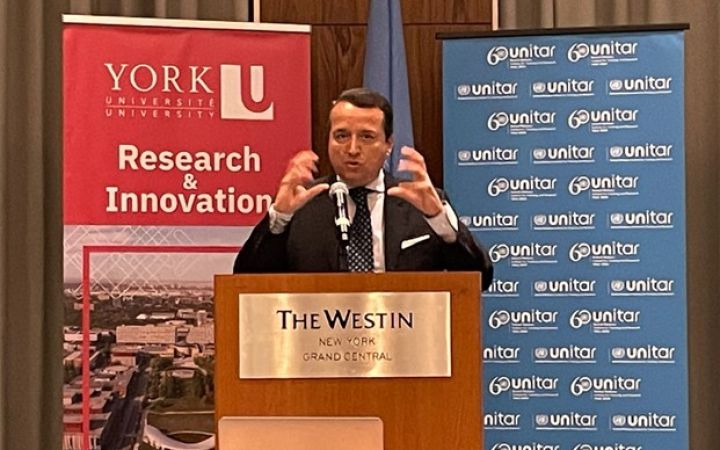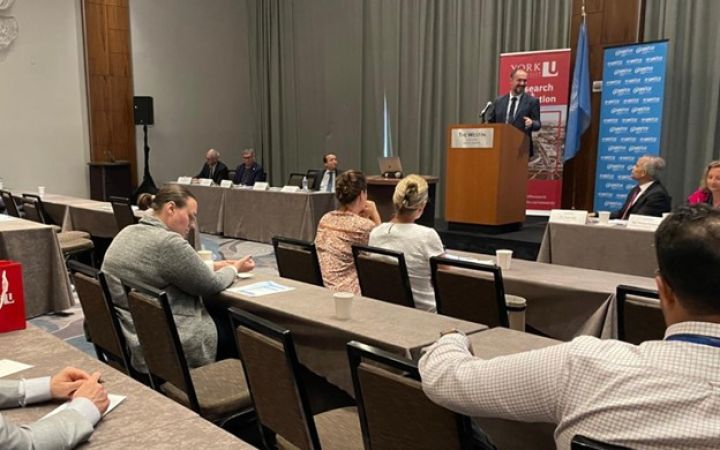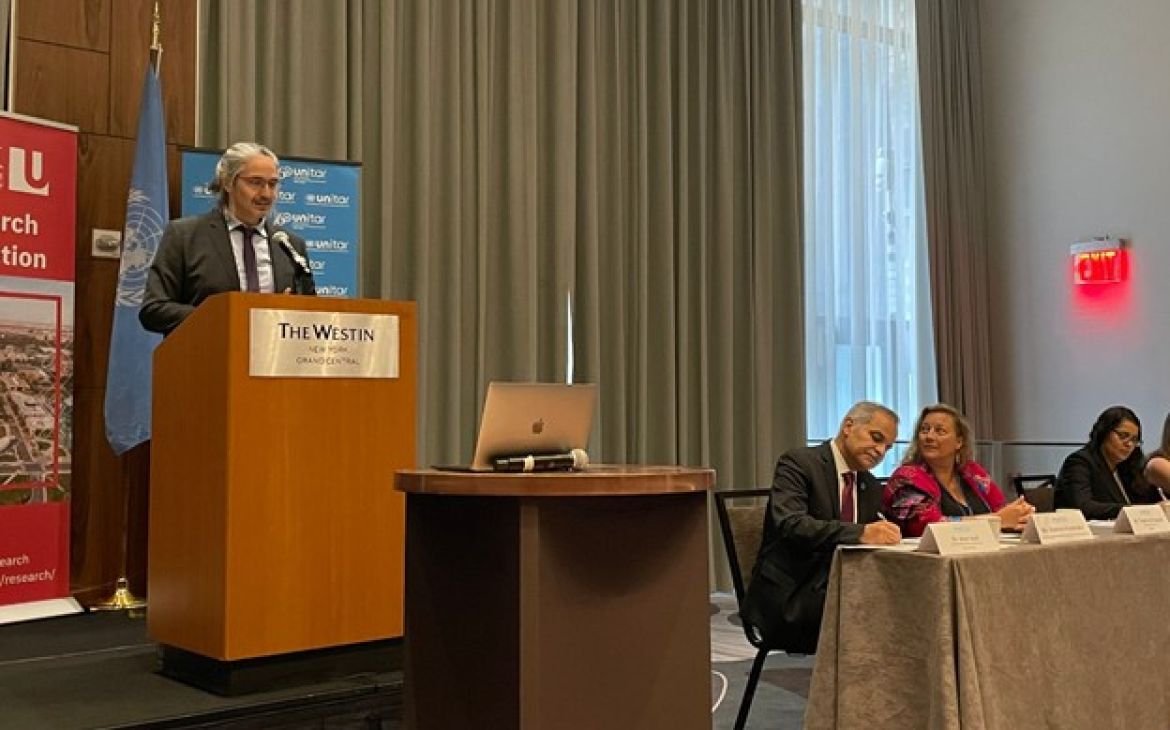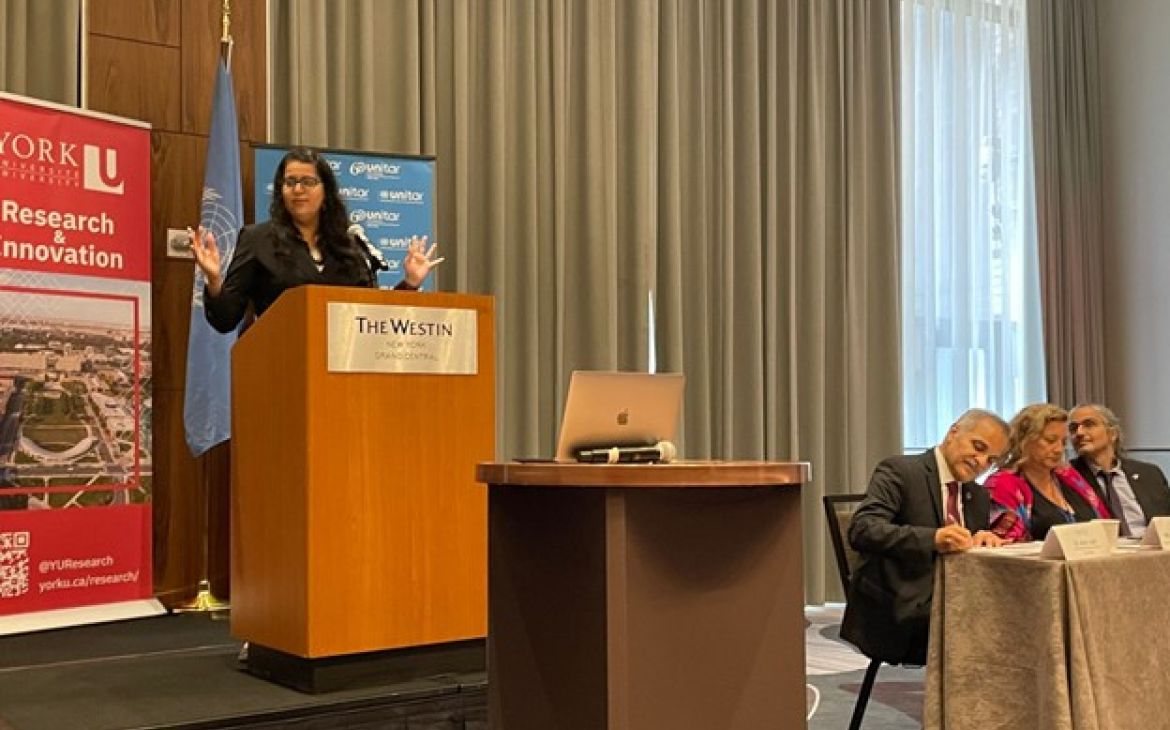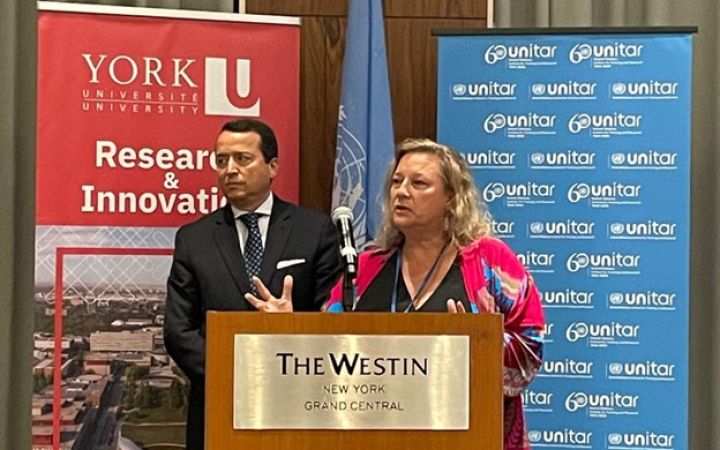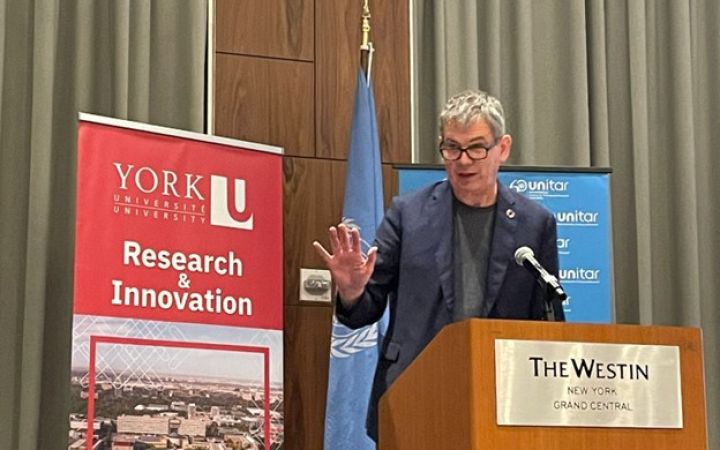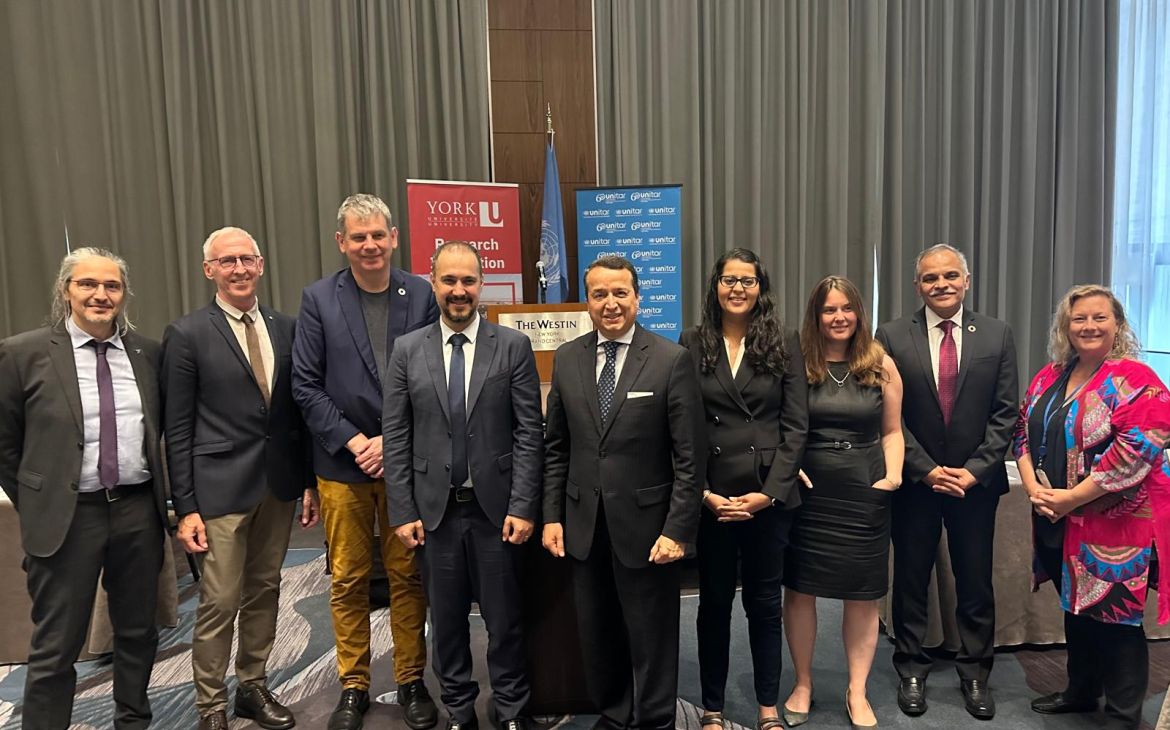16 July 2024, New York City, United States of America – UNITAR’s Global Water Academy (UGWA) co-hosted its official side event at the High-level Political Forum (HLPF) with York University entitled ‘Pathways to Resilience: Advancing Solutions for Global Freshwater Quality’. This UGWA HLPF side event explored the multilateral and environmental drivers that exacerbated the deterioration of the quality of global freshwaters.
Throughout the event, the importance of international networks was emphasized for water quality education, capacity building, and cross-disciplinary resource-sharing to address the global freshwater crisis. These themes were further echoed during the HLPF side event on ‘SDG 6 and Water Action Agenda Special Event’ held on the same day.
This fourth annual SDG 6 and Water Action Agenda Special Event marks a significant step in the UN's efforts around water and sanitation since the 2030 Agenda began. Building on the momentum from the 2023 UN Water Conference and the adoption of resolution A/RES/77/334, which saw over 800 commitments from various sectors, this event aims to further accelerate global action towards SDG 6. The highlight of this year’s event is the launch of the UN System-wide Strategy for Water and Sanitation ( UN SWS), created through an extensive collaboration among UN-Water Members and other multi sectorial entities to enhance coordination and delivery of water priorities.
For that purpose, the heads of UN-Water Members, including Mr. Nikhil Seth, Assistant Secretary-General, and Executive Director, accompanied by Mr. Mejia met together for the UN-Water Principals meeting to reflect on the Collaborative Implementation Plan within the UN SWS, and discuss priority actions that can be incorporated into the strategy.
During the UGWA event, the following panellists examined innovative solutions, including scientific, technological, natural, and governance approaches, to bolster freshwater resilience, transboundary governance, and policy alignment with SDG 6 targets: Mr Alex Mejia, Director, Division for People and Social Inclusion, UNITAR, Mr Amir Asif, Vice-President, Research and Innovation, York University; Mr Federico Properzi, Chief Technical Advisor, UN-Water; Ms Dianna Kopensky, Head, Freshwater Ecosystems Unit, Marine and Freshwater Branch UNEP; Prof. Kaveh Madani Director of the United Nations University Institute for Water, Environment and Health; Prof. Sapna Sharma, York University Academic Director, UNITAR Global Water Academy; Prof. Stephanie Gora, Assistant Professor, Faculty of Civil Engineering York University; Mr. Duncan Ross, Chief of Data and Analytics, Times Higher Education; and Mr. Kevin Hall, President and Vice-Chancellor, University of Victoria.
In his opening remarks, Mr. Mejia stressed the importance of empowering communities through knowledge sharing and capacity building as it is critical for achieving the objectives of SDG 6. Further, he stated that the UGWA’s mission of tackling diverse aspects of the water sustainability crisis through training, capacity-building, research, and knowledge mobilization has never been more important as a means of fostering collaboration in water management to address these global water challenges and create more sustainable solutions for the future.
In Mr. Asif’s opening remarks, he highlighted that many Indigenous communities in Canada still struggle with access to clean drinking water. Even those near urban centres like Toronto, (home to York University), face water insecurity issues. Disproportionately, Asif claimed women in these communities bear the burden of water scarcity due to their traditional responsibilities in water collection, household management, and caregiving. In many Indigenous cultures, water holds profound cultural significance and is central to efforts to protect water resources, the environment, and Indigenous rights. Asif further stated,
that by fostering collaboration and sharing available solutions, we can leverage water as a catalyst for health, equality, and well-being, as well as advocate for peace and protecting a shared world.
In initiating the panel discussion, Mr Properzi discussed the recently implemented UN SWS on water to the United Nations and emphasized the importance of creating a common unified framework, with capacity development and education acting as main pillars. Multisectoral partnerships that are interwoven in the UN SWS are crucial for the sustainable development agenda as they bring diverse perspectives together, enhancing collaborative efforts on global water issues.
In Prof. Sharma’s remarks, she highlighted the importance of water quality as an important consideration for water security and discussed both the complex environmental stressors affecting water quality worldwide, and also some solutions to consider what people without clean water can do, and how we think about what we can do moving forward. One of the solutions Sharma highlighted was through an illustrated story of David Shindler's research on eliminating phosphorus from freshwaters as it is a primary driver of water quality degradation and harmful quality in creating algae blooms. Since being published in the 1970s, this research has shifted bilateral policy between Canada and the US through the Great Lakes Agreement and impacted water policies worldwide.
Further effective solutions mentioned by Sharma to repair water quality include:
- Reducing the use of fertilizer
- Changing the timing of fertilizer output to limit the amount of nutrients entering into lakes (at what time of year does a farmer apply fertilizer into their field to limit the amount of nutrients entering freshwater).
- Promoting green infrastructure in urban and suburban environments to reduce water run-off
- Conserving wetlands, and repairing vegetation.
Moreover, Ms. Kopansky noted the significant impacts on global water quality, including the rapid loss of wetlands and the high frequency of water-related disasters. She highlighted that 1 ⁄ 5 of water basins are losing their features due to flooding, and 9/10 disasters have been triggered by water-related natural hazards. This mismanagement of water and a combination of climate change has had devastating consequences leading to over 2 billion people under water-stressing conditions worldwide. Kopansky stressed the importance of making education and the findings of its scientific research readily available, understandable, and accessible to policymakers to inform the decisions that they make.
Kopansky stated,
We are alarmingly off track to achieve SDG 6, and it is because SDG 6 is the second least funded of the SDGs, after SDG 14, so again, water. This is why the UN SWS is so timely and important to do something with water through collaboration and enable us all to play our role in attributing our special place in the multisectoral place we call water [...] We can only do it better if we work more towards collaboration, not competition. It is through working together with the UN SWS that we can make a much overdue impact on the SDGs to address the current challenges associated with SDG 6.
Additionally, Prof. Madani stressed the persistent nature of water quality issues and the need for the water community to collectively work to solve these problems. He emphasized the importance of including farmers in the water management process and improving computational capacity for better water management. He also mentioned the significance of cheap food production in the water sector as a vehicle to include farmers in the decision-making process that informs our policymakers.
Following the release of the UNU-INWEH Global Water Security Assessment in 2023, which examined 186 countries to analyze their progress towards SDG 6, the report found that 50% of those countries are in water-insecure zones, and more than half of the member states are not water secure.
Madani stated “We have an unprecedented ability to collect data, to monitor it, to measure, to process, to compute. This is something we didn’t have before. We have the capacity to help. When it comes to those interventions through technology, we have an unprecedented capacity, but when it comes to context, and dealing with the mismanagement of water, we still are not there. However, there is a caveat here. Yes, we have the power to compute, but we still don’t understand the water sector completely”. Madani exemplified the importance of deepening our understanding of issues in the Global South and amplifying those voices to better grasp why simply adhering to proposed solutions from Northern scientists is not always contextually relevant.
Furthermore, Prof. Gora discussed the multifaceted nature of water management, covering infrastructure, policy development, funding, and governance in remote arctic landscapes. She highlighted the critical role of operators in making water systems work and advocated for a multivariate approach tailored to the unique challenges of each location to ensure safe drinking water is preserved for all.
In discussing the supply chain of water management from source to tap, Gora stated,
In Canada, we normally pump out 250 litres per day per person. The water is then sent to a water treatment plant, whether through chemical filtration like chlorination, or physical filtration like UV, and the goal here is to kill chemicals, toxins, and other organisms that can have harmful impacts on the population. The water then goes underground through a series of pipes and gets distributed to communities [...] In the arctic communities, they’re built differently in permafrost, and they do not have the same infrastructure in place. Water is delivered by truck. This introduces all sorts of different hazards.
Gora’s research revealed a need here in Arctic communities to have the water that is stored in tanks to be regularly monitored due to the huge safety risks it poses when water is delivered to buildings and left in cistern tanks.
Mr. Ross closed the panel discussion by emphasizing the role of higher education in achieving the SDGs, particularly SDG 6. He pointed out that universities are key in teaching more about water management, and also in outreach efforts to help communities understand their role in water conservation.
Universities are the custodians of the global goals [...] They help our communities understand how to respond to the water challenges we’re facing. It’s not just about teaching, but very importantly about listening. When we think about those global south connections, again I think that’s something where universities can certainly learn a lot from universities elsewhere”. For instance, Ross highlighted that while the challenges that India faces are different then what Canada faces, there will be commonalities, such as the challenge of the use of water in farming.
Following the panel discussion, Mr. Hall provided a clear message in his closing remarks, “I want to send a message to all the policymakers out there. It's not working. Water and sanitation is a basic right to life. We are falling behind. We need policy, and we need proper funding. We need environmental protection, but most importantly, we need empathy”.


